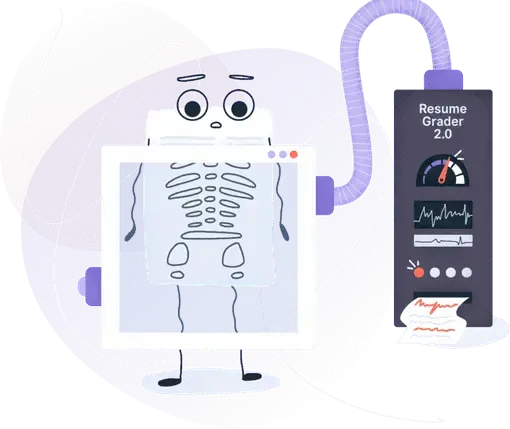Strong Work Ethic Skills for Resumes: A Complete Guide in 2026
Your strong work ethic demonstrates your reliability and dedication, making you a dream fit for every team.


Is your resume ATS-friendly?
Drop your resume here or upload a file to find out if the skills in your resume are readable by an ATS.
Want to show employers you're the kind of person who gets the job done no matter what? It all starts with how you describe a good work ethic on a resume.
In this guide, we'll explore how to spotlight your dedication, reliability, and hustle in a way that jumps off the page. A strong work ethic is more than just a buzzword. It's a trait that can set you apart, and we’ll help you make sure it shines through in your resume!
Key takeaways
- Strong work ethic skills include dependability, time management, initiative, and the ability to stay focused under pressure.
- Demonstrating ethical skills on a resume involves quantifying your impact with metrics like time saved, cost reductions, or improved productivity.
- Incorporate specific examples of how your work ethic led to meaningful outcomes, such as meeting deadlines ahead of time or taking initiative in solving problems.
- Work ethic is crucial in many roles, from healthcare and customer service to project management and beyond, where reliability and initiative are valued.
- Work ethic can be developed by setting clear goals, practicing self-discipline, and continuously learning from setbacks.
What are work ethic skills for a resume?
A strong work ethic on a resume shows that you value hard work, take pride in what you do, and approach tasks with dedication and focus. It’s not just about doing the bare minimum but about being reliable, productive, and always pushing to deliver your best.
People with a strong work ethic don't leave tasks half-done or shy away from challenges. Instead, they tackle problems head-on and find ways to improve.
A strong work ethic matters, but knowing when to highlight it on your resume is crucial. Here’s when to show those skills to employers.
When to put work ethic skills on a resume
You should showcase your work ethic skills on your resume whenever you want to stand out as someone who goes above and beyond.
Most roles require reliability, teamwork, and resilience in the face of challenges. Since many candidates claim they possess these qualities, it’s essential to stand out. One way to do it is by demonstrating a strong work ethic with concrete examples that show how you've applied these traits effectively.
Success is no accident. It’s hard work, perseverance, learning, studying, sacrifice, and most of all, love of what you’re doing.
Pelé, Professional footballer
How to list work ethic skills on a resume
Want to feature your good work ethic on your resume? Here’s how to do it right.
- Include numbers to quantify impact. For example, “Increased team productivity by 20% through proactive task management and dedication.”
- Highlight how your strong work ethic contributed to your achievements. Use examples like "Consistently met deadlines ahead of schedule" or "Took initiative in improving team processes."
- Mention your work ethic directly in your personal statement, like “Dedicated and reliable professional with a proven ability to handle multiple tasks efficiently.”
- Incorporate action verbs that reflect your work ethic, like "led," "improved," "streamlined," or "delivered" to show initiative and commitment.
Now that you understand how to show your strong work ethic, here’s a sample resume to demonstrate how it all fits together.
Resume sample for showing strong work ethic skills on a resume
Feeling stuck? Take a look at Emily Thompson’s pediatric nurse resume to spark some ideas!
Emily Thompson
Pediatric Nurse
(512) 555-4476 | e.thompson@enhancv.com | @LinkedIn | Houston, TX
Summary
Patient-focused Pediatric Nurse with over nine years of experience and a strong work ethic, dedicated to providing high-quality care to pediatric patients. Known for excellent communication, attention to detail, and the ability to remain calm under pressure. Proven ability to manage multiple tasks efficiently while maintaining a compassionate and caring approach. Seeking to bring my expertise and dedication to a reputable healthcare organization.
Experience
Pediatric Nurse
Texas Children’s Hospital, Houston, TX
May 2018 – Present
- Provide compassionate care to over 20 pediatric patients daily, ensuring high standards of care were consistently met.
- Collaborate with physicians and healthcare teams to create individualized care plans, contributing to improved patient outcomes.
- Take initiative in educating patients’ families about post-discharge care, reducing readmissions by 15%.
- Manage complex cases with attention to detail, ensuring all treatment protocols were followed accurately and on time.
Registered Nurse (RN)
Children’s Medical Center Dallas, Dallas, TX
July 2015 – April 2018
- Administered medications, treatments, and therapies to pediatric patients while closely monitoring their condition.
- Proactively handled emergency situations, maintaining composure and delivering life-saving interventions.
- Assisted in the implementation of new pediatric care protocols, improving patient safety and reducing medication errors by 10%.
- Volunteered to mentor new nursing staff, reducing onboarding time by 20% through effective guidance and support.
Education
Bachelor of Science in Nursing (BSN)
University of Texas Health Science Center at Houston
Graduated: 2015
Certifications
- Certified Pediatric Nurse (CPN) – 2019
- Basic Life Support (BLS) – Current
- Pediatric Advanced Life Support (PALS) – Current
Skills
- Pediatric Care and Patient Management
- Family Education and Support
- Time Management and Multitasking
- Emergency Response and Critical Care
- Compassionate Communication
- Detail-Oriented and Accurate Documentation
Languages
- English (Native)
- Spanish (Intermediate)
Discover how well your resume passes through ATS with our intuitive resume checker.
Is your resume good enough?
Drop your resume here or choose a file. PDF & DOCX only. Max 2MB file size.
Now that you’ve highlighted your work ethic, let’s see where to place these skills on your resume.
Where to put good work ethic skills on a resume
We’ve already mentioned that your resume summary or objective is the perfect spot to underline your work ethic, but don’t stop there!
For more clarity, let’s tie these examples directly to the pediatric nurse role from the sample above. In your experience section, bring it to life with examples like: “Improved patient discharge procedures, reducing wait times by 25%”.
For extra impact, add an "Achievements" section to draw attention to specific successes, such as “Developed a new patient monitoring process that improved response times by 20%” or “Trained nursing staff on updated pediatric care protocols, leading to a 15% reduction in medication errors.”
Work ethic motivation
According to Worldmetrics.org 81% of employees say that opportunities for career advancement motivate them to maintain a strong work ethic.
Now, let’s present a few real-life resume examples.
How to present strong work ethic skills in the summary
Your resume summary is your chance to make a strong first impression. Think of it as the opening line in a story about how you're not just skilled but committed to getting the job done right, every time.
Here’s an example:
How to present strong work ethic skills in the experience section
The experience section, being the most extensive part of your resume, is perfect for showcasing work ethic skills. Use this space to illustrate how your determination led to overcoming challenges, improving efficiency, or achieving measurable results.
Here’s how you can highlight your work ethic in the experience section:
- •Consistently met tight deadlines by streamlining financial reporting processes, increasing team efficiency by 25%.
- •Took initiative in optimizing cross-departmental collaboration, resulting in a 15% improvement in data accuracy.
- •Led a high-pressure project that required quick problem-solving, delivering results ahead of schedule and under budget.
- •Recognized for proactively identifying areas for process improvements, reducing reporting errors by 20%.
- •Demonstrated strong leadership and work ethic by volunteering for additional responsibilities, contributing to team success during peak periods.
How to present strong work ethic skills in an achievements section
Present your strong work ethic by linking it to achievements in your past and current jobs. Share examples where your determination improved processes, solved issues, or contributed to company goals. Quantify the results to make your contributions clear.
Here are some work ethic skills that can help you get ahead.
Top skills to pair with a strong work ethic on a resume
When listing your strong work ethic skills on your resume, focus on pairing them with abilities that are most relevant to the job you're applying for.
You can integrate skills like time management, teamwork, problem solving, and communication into your "Experience," "Education," or "Summary" sections. Pairing these skills with your strong work ethic highlights how your dedication has truly impacted your previous roles.
For better clarity, we’ve customized the table below specifically for the nurse role, pairing relevant hard and soft skills to showcase a strong work ethic in healthcare.
20 skills that strengthen your strong work ethic on a resume
| Hard skills | Soft skills |
|---|---|
| Electronic Health Records (EHR) systems | Attention to detail |
| Vital signs monitoring equipment | Time management |
| IV infusion pumps | Problem-solving |
| Patient management software | Communication |
| Medical billing and coding systems | Organization |
| Telemedicine platforms | Adaptability |
| Wound care technology | Compassion |
| Medication dispensing systems | Critical thinking |
| EKG machines | Teamwork |
| Patient tracking systems | Multitasking |
This powerful mix of technical skills and interpersonal strengths creates a resume that really packs a punch.
Now that we've covered the essentials, let's dive into the types of roles where a good work ethic is an absolute game-changer. On top of that, you can see how these skills make you stand out from the crowd.
Which job roles require strong work ethic skills
- Healthcare professionals (nurses, doctors, EMTs)
- Project managers
- Teachers
- Customer service representatives
- Accountants
- Lawyers
- Social workers
- Police officers
- Journalists
- Politicians
Knowing which roles need a strong work ethic, let’s explore how to spotlight it on your resume even when you don’t have that much experience.
Strong work ethic skills for students
As a student, having strong work ethic skills can really help you, especially if you have limited professional experience.
Think about any projects, classes, or extracurricular activities where you showed perseverance, managed your time well, or tackled challenges.
Talk about moments when your good work ethic made a difference like working well with others or putting in extra effort to get things done right.
Strong work ethic skills for freshers/ interns
Moving from the classroom to the workplace, students and interns can leverage their strong work ethic to make a positive impression.
Let’s explore how they can present it effectively.
Strong work ethic skills for a junior
With one or two years of experience under their belt, juniors can emphasize how their heightened ethic skills played a key role in helping them adapt quickly, take on more responsibilities, and deliver quality results under pressure.
Juniors can show how their previous or current job taught them good work ethics, showing recruiters they're loyal and recognize the influence of their mentors
Work ethic is about more than just clocking in and out. It involves valuing dedication and effort, seeing each task as part of a bigger picture rather than just ticking boxes.
Think work ethic is just for workaholics?
Think again!
A whopping 76% of employees admitted they’d work extra hours—unpaid—just to get the job done.
Clearly, “quiet quitting” hasn’t caught on with everyone.
How to quantify strong work ethic skills
Demonstrating your work ethic with concrete results on your resume makes it more than just a buzzword. Including measurable results—like projects completed early, efficiency gains, or resolved issues—turns your commitment into clear proof of impact, showing how your work ethic drives real results.
This shifts your work ethic from a vague trait to a clear, valuable asset for potential employers.
Check out some great tips below:
- Offer tips on how to link specific metrics, such as percentages, dollar amounts, or time saved, to illustrate how well the skill was applied in real-life situations.
Best practices for measuring good ethical skills
- Highlight improvements you made, such as “Increased team productivity by 20% through efficient task management,” to show how your work ethic directly impacted results.
- If your work helped save money or increase revenue, say something like, “Reduced operational costs by $10,000 by optimizing workflows.” This connects your effort to financial gains.
- Demonstrate how your commitment improved efficiency, for example, “Cut project completion time by 15% through effective time management.”
- Instead of vague descriptions, write concrete numbers: “Handled 30% more clients per week by staying proactive and organized.”
- Whether it's solving problems or meeting goals, include metrics like “Resolved 95% of customer inquiries on first contact, showing strong dedication to customer service.”
Three tips on how to improve your strong work ethic skills
Staying committed isn’t always easy, but it’s essential for growth. Whether you're trying to tackle daily tasks or working toward bigger goals, enhancing your persistence can make a huge difference. A stronger sense of focus helps you follow through, stay organized, and keep pushing even when things get tough.
These practical steps can help you grow in this area.
Set clear, achievable goals
Breaking down large goals into smaller, manageable tasks helps you stay focused and keeps the bigger goal from feeling overwhelming. This approach fosters a strong work ethic by encouraging steady progress.
PRO TIP
Start by setting one clear goal per week and track your progress. This will build consistency and reinforce your commitment.
Hold yourself accountable
Accountability is a key part of a strong work ethic. Sharing your goals with someone else, such as a mentor or friend, helps ensure that you remain committed to your responsibilities.
PRO TIP
Check in with your accountability partner each week to discuss progress and any challenges you’ve encountered.
Practice self-discipline
Self-discipline is at the core of a strong work ethic. It allows you to push through distractions and stay focused, even when you don’t feel motivated. Building this discipline is essential for staying committed to your tasks.
PRO TIP
Set small deadlines and reward yourself for sticking to them. Commit to finishing tasks—even when it feels tough—you’ll feel rewarded in the end!
Frequently asked questions about strong work ethic
How can I show a strong work ethic during a job interview?
You can show a strong work ethic during an interview by providing examples of how you’ve taken initiative, met deadlines, or worked through difficult situations. Discussing times when you went above and beyond for a project or solved a challenging problem can highlight your dedication and commitment.
How does a strong work ethic contribute to career growth?
A strong work ethic can lead to career growth by earning the trust of employers, demonstrating reliability, and showing the ability to handle increasing responsibilities. It can open doors to promotions, leadership roles, and more challenging projects because you consistently deliver quality results.
Can a strong work ethic help prevent burnout?
A strong work ethic, when balanced with self-care, can help prevent burnout by encouraging efficient work habits and time management. However, it's important to avoid overworking and to recognize the need for rest to maintain long-term productivity and well-being.
How can I maintain a strong work ethic while working remotely?
Regular communication with your team and self-discipline are key to staying on track and delivering results.
Make one that's truly you.




